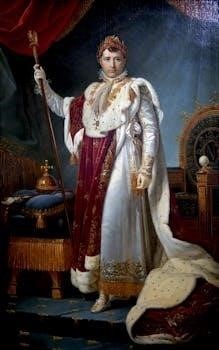The Prisoners Throne⁚ An Overview
The Prisoners Throne, the second book in The Stolen Heir duology, concludes the enthralling story of Elfhame. It focuses on Prince Oak’s imprisonment and his struggle against a vengeful queen. This highly anticipated novel is a thrilling conclusion to the series.
Plot Summary and Key Conflicts
Following the events of The Stolen Heir, Prince Oak finds himself imprisoned in the icy north, held captive by the monstrous new queen, Wren. He is paying the price for his past betrayals and must rely on his cunning and charm to survive. The central conflict revolves around Oak’s struggle to navigate his complex relationships, particularly with Wren, and his duty to Elfhame. He is torn between his feelings for Wren and the loyalty he owes to his family and his kingdom. The story explores the consequences of Oak’s choices, as he is forced to confront the emotional weight of his actions. A new war looms, and the fate of Elfhame hangs in the balance, as Oak tries to figure out where his loyalties lie. He must decide whether to regain Wren’s trust or remain faithful to Elfhame, all while battling his internal conflict and external pressures.

Main Characters and Their Roles
The story features Prince Oak, who is imprisoned and must navigate a treacherous path; Wren, the vengeful queen, holds significant power. Cardan and Jude’s influence from the previous series is also essential.
Prince Oak’s Perspective
The Prisoners Throne shifts the narrative focus to Prince Oak, offering readers a deep dive into his thoughts and motivations. Imprisoned in the icy north, Oak grapples with the consequences of his past actions, which led to his capture by the new queen. His perspective is filled with internal conflict, as he must balance his desire for freedom with his complicated feelings for Wren and his duty to Elfhame. This shift provides insight into his strategic mind, as he relies on charm and calculation to survive. Oak’s struggle with his betrayal and the emotional weight of his choices are central to the narrative. We see his past and future colliding in a dangerous game for Elfhame’s rule, making his perspective a crucial part of the story.
Wren’s Role and Motivation
Wren, the monstrous new queen, plays a pivotal role in The Prisoners Throne as she holds Prince Oak captive. Her motivations are driven by a desire for vengeance. Wren’s actions are also shaped by her past experiences, making her a complex character with shifting loyalties. Her position as the new queen gives her significant power over Oak and Elfhame, creating high stakes for everyone involved. The story explores the intricacies of her relationship with Oak, as their past intertwines with the present conflict. Wren’s perception of Oak changes as the narrative progresses, adding layers to their dynamic. Her role as both captor and a character with her own agenda makes her essential to the story’s development and tension.
Cardan and Jude’s Influence
Cardan and Jude, the iconic High King and Queen of Elfhame, wield considerable influence throughout The Prisoners Throne. They are determined to retrieve their stolen heir, Prince Oak, and are willing to use any means necessary to achieve this goal. Their presence adds a crucial layer to the narrative, as their past relationships and formidable power intertwine with the present crises. Though not the central characters, their actions and decisions have significant consequences for the main plot and for Oak’s fate. Their involvement highlights the ongoing political tensions within Elfhame and underscores the stakes of Oak’s imprisonment. Their dedication to retrieving Oak also emphasizes their strong sense of family and responsibility. Jude and Cardan’s influence showcases their status as powerful figures.

Themes Explored in the Novel
The Prisoners Throne delves into complex themes of love versus loyalty, betrayal and redemption, and power with its consequences. These themes drive the characters’ actions and shape the narrative arc of the story.
Love vs. Loyalty
The central conflict in The Prisoners Throne revolves around the intense struggle between love and loyalty, particularly for Prince Oak. He finds himself torn between his feelings for Wren and his duty to Elfhame, a conflict that defines much of his journey. Oak’s heart is pulled in different directions as he must decide whether to prioritize his personal desires or his responsibilities to his kingdom and family. This internal battle showcases the complexities of relationships in a world where power and politics often dictate choices. The narrative explores the notion that love can be a powerful motivator but also a dangerous distraction when the fate of a kingdom is at stake. Ultimately, the novel questions what it truly means to be loyal and the sacrifices one must make for love.
Betrayal and Redemption
The Prisoners Throne deeply explores themes of betrayal and redemption, primarily through Prince Oak’s character arc. Having committed acts that led to his imprisonment, Oak must grapple with the consequences of his past choices. The story examines how betrayal can fracture trust and relationships, causing lasting damage. However, it also offers the possibility of redemption, as Oak navigates his path toward making amends. His actions show a desire to earn forgiveness, even when it seems impossible. The journey is riddled with challenges, forcing Oak to confront his mistakes and strive for a better future. The novel raises questions about whether true redemption is achievable and what sacrifices must be made to attain it.
Power and its Consequences
In The Prisoners Throne, the theme of power and its consequences is powerfully illustrated through the characters’ actions and their impact on Elfhame. The monstrous new queen, Wren, wields her power ruthlessly, showcasing the corrupting nature of unchecked authority. Prince Oak’s struggle highlights the precarious balance of power and the responsibility that comes with it. His decisions demonstrate how wielding or relinquishing power can lead to both positive and negative outcomes. The novel examines the various forms of power, from political and magical to personal influence, and reveals how each can be used and abused. This exploration serves as a cautionary tale about the delicate nature of authority and its potential for destruction.

The World of Elfhame
Elfhame, the setting for The Prisoners Throne, is a darkly enchanting realm filled with fae magic and dangerous secrets. The icy north serves as a contrasting backdrop to the court intrigues.
Setting and Atmosphere
The narrative of The Prisoners Throne primarily unfolds in the chilling, icy north of Elfhame, a stark contrast to the familiar courts and vibrant landscapes previously seen in the series. This harsh environment mirrors the protagonist, Prince Oak’s, internal struggles and the grim situation he faces as a prisoner. The atmosphere is laden with a sense of foreboding and tension, reflecting the precariousness of Oak’s position and the looming threat of a vengeful queen. The setting contributes significantly to the overall mood, emphasizing the isolation and vulnerability of the characters. It also highlights the dangerous power dynamics at play, creating a world where both beauty and brutality coexist. The shift in locale serves to amplify the stakes, making Elfhame feel both familiar and menacingly new.
The Duology’s Conclusion
The Prisoners Throne serves as the final chapter, resolving major plotlines and providing closure for Prince Oak’s journey. It explores the implications for Elfhame’s future, concluding the Stolen Heir duology.
Resolution of Major Plot Points
The narrative culminates in the resolution of Prince Oak’s imprisonment, where his cunning and charm are tested to their limits under the control of a monstrous new queen. The story addresses the consequences of Oak’s past betrayals and his complex relationship with Wren. Furthermore, the influence of Cardan and Jude surfaces as they attempt to retrieve their heir. The book offers a final confrontation with the looming threats to Elfhame, forcing characters to make difficult choices between love and duty. It also untangles the web of secrets and deceit that has plagued the characters, thus bringing the main conflicts to a satisfying end. The resolution also showcases the transformation of key characters and their understanding of the past.
Implications for the Future of Elfhame
The conclusion of The Prisoners Throne leaves a lasting impact on Elfhame’s future, hinting at new power dynamics and potential conflicts. The choices made by Prince Oak and others shape the political landscape, suggesting a period of change and adjustment within the fae realm. The resolution of major threats does not necessarily mean peace, and the narrative teases possible future challenges with new alliances and rivalries. The relationships between characters like Oak, Wren, Jude, and Cardan suggest ongoing developments, thus impacting the realm’s stability. The ending also sets the stage for future stories in the magical world, with loose threads and unanswered questions. It is an open door for new adventures.

Critical Reception and Reader Response
The Prisoners Throne has garnered positive reviews, praised for its thrilling plot and emotional depth. Many readers found it a satisfying conclusion to the duology, appreciating Holly Black’s storytelling.
Overall Assessment and Reviews
The Prisoners Throne has been widely lauded as a fitting end to The Stolen Heir duology, satisfying fans with its complex characters and intricate plot. Many reviews highlight the emotional depth of the narrative, particularly Oak’s internal struggles and his complicated relationships. Readers appreciate the return to the enchanting world of Elfhame and the skillful weaving of familiar characters like Cardan and Jude into the story. The novel’s pacing, action sequences, and unexpected twists are consistently praised, making it a gripping read. Some reviewers note the book’s exploration of loyalty, betrayal, and love as significant strengths. Overall, the critical and reader response suggests that The Prisoners Throne delivers a compelling and emotionally resonant conclusion to the series, solidifying Holly Black’s position as a master of young adult fantasy.

Leave a Reply
You must be logged in to post a comment.